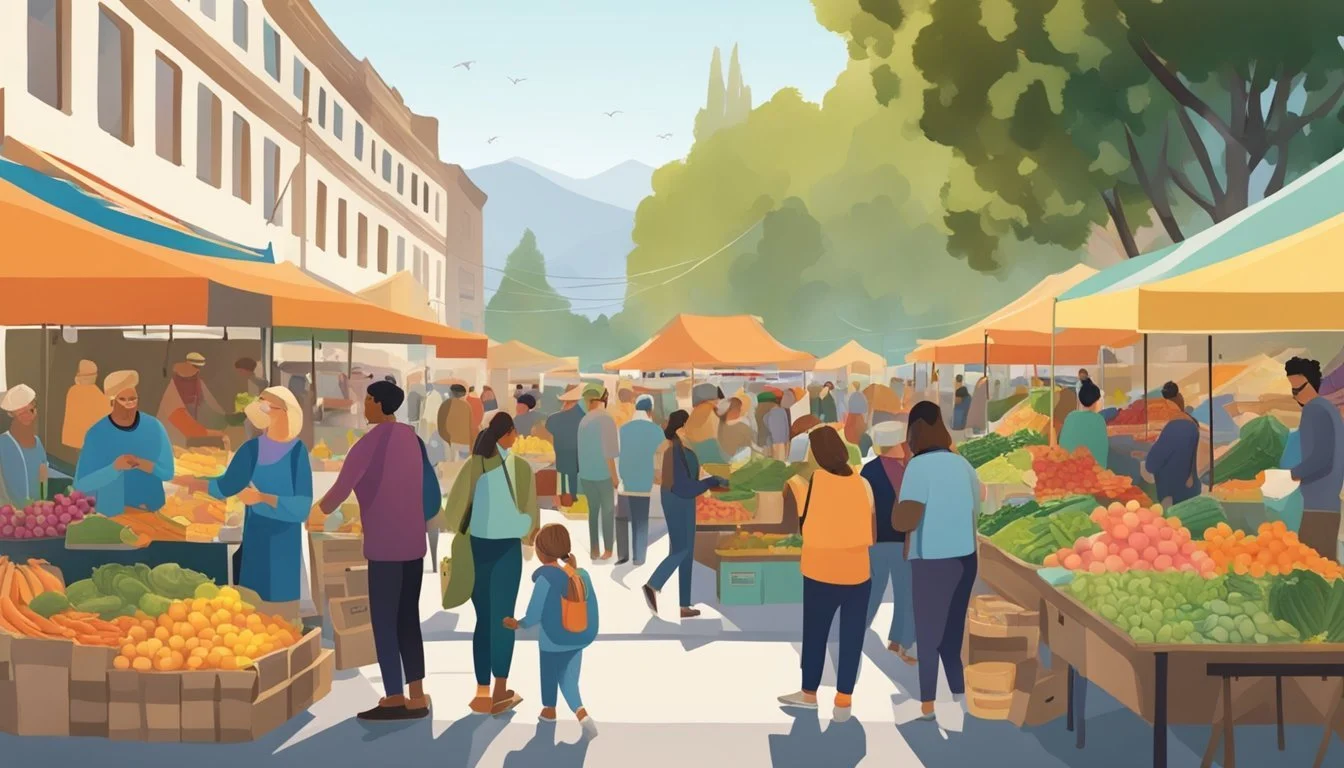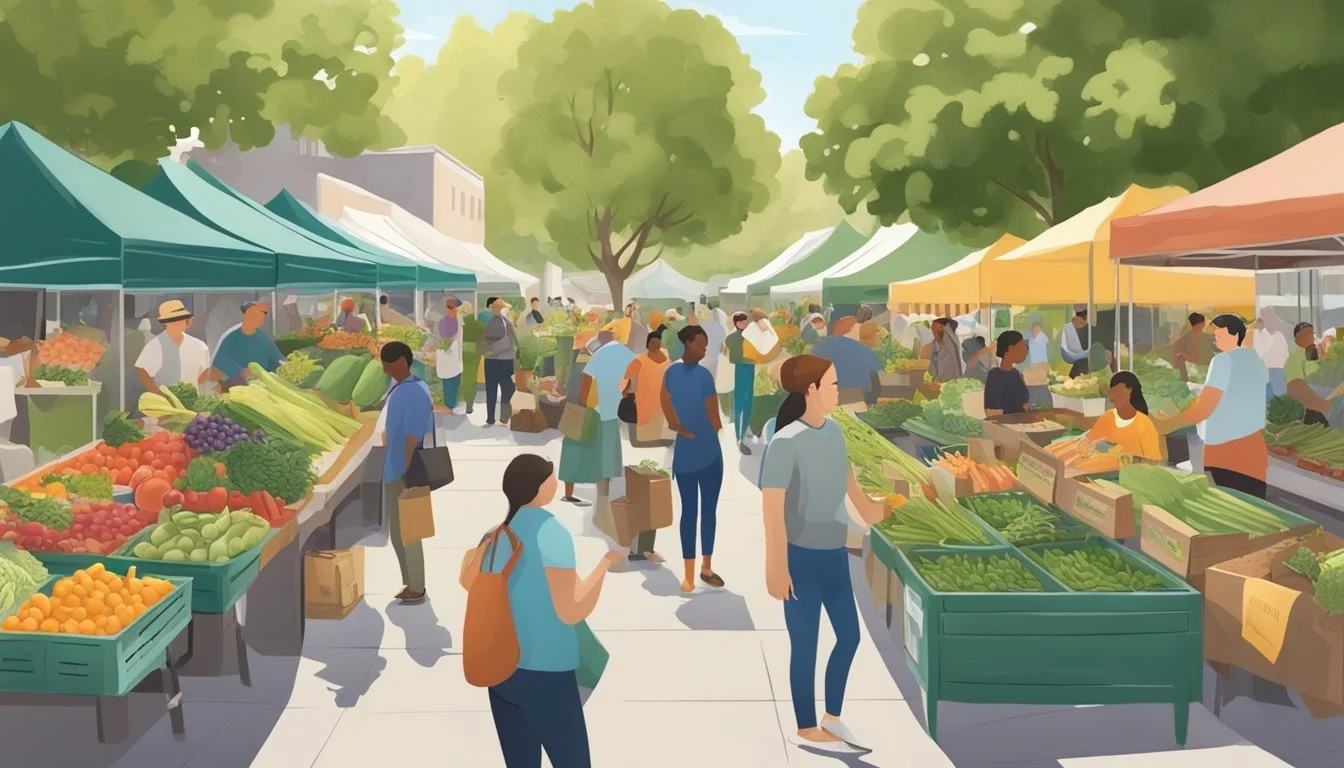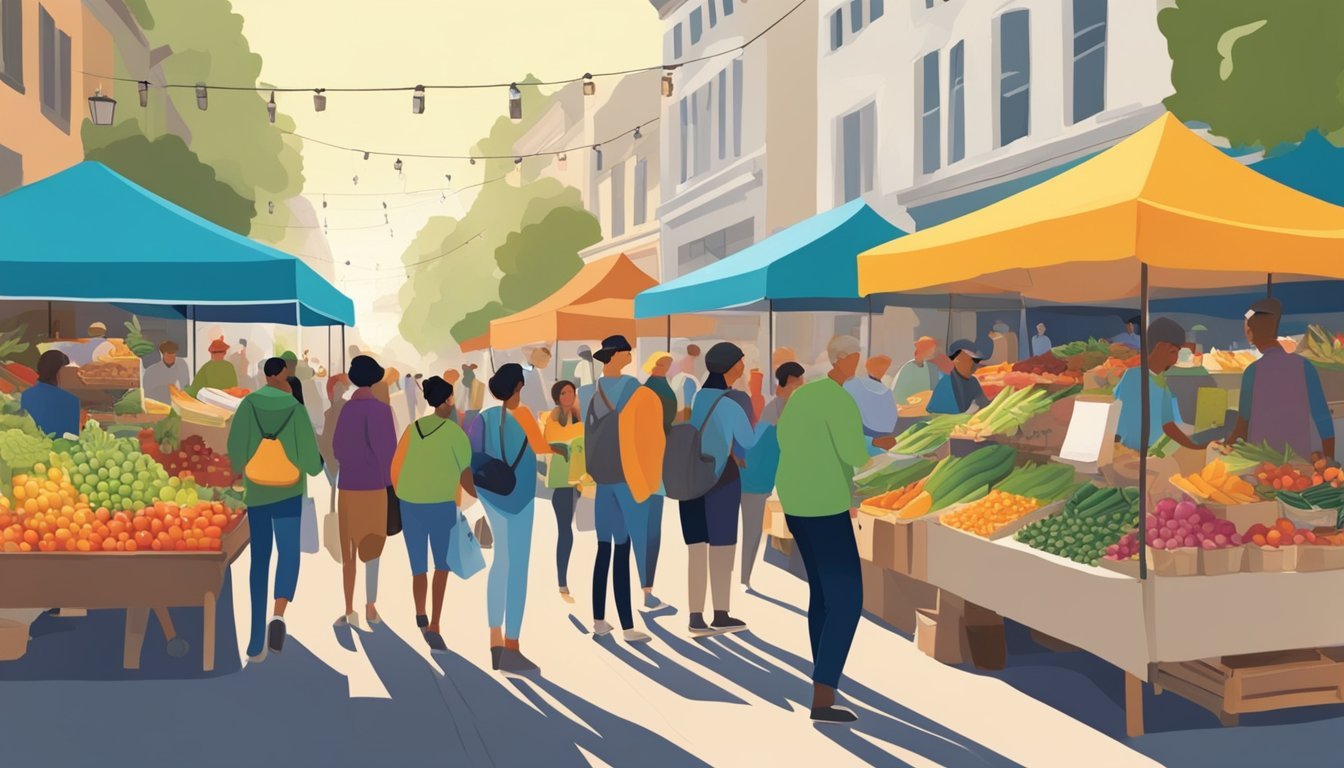Community Supported Agriculture (CSA) in Berkeley, CA
A Guide to Local Farm Shares
Community Supported Agriculture (CSA) is gaining traction in Berkeley, California, as a way for consumers to buy seasonal food directly from local farmers. By purchasing a share of a farm's harvest in advance, members receive a regular supply of fresh produce and, in turn, offer financial stability for participating farms. This model of agriculture supports local economies, reduces the carbon footprint associated with long-distance food transport, and encourages sustainable farming practices.
In the East Bay area, Berkeley residents have access to a variety of CSA programs that emphasize organic farming methods. These CSAs ensure that households receive a diversity of fresh fruits and vegetables, which are often certified organic and grown with care for the environment. The collaboration between the community and farmers fosters a closer connection to the food source and promotes healthier eating habits through the consumption of seasonal, organic produce.
Berkeley's CSA scene reflects a dedication to maintaining high-quality standards in food production and community engagement. Local farms like Cloverfield Organic Farm and Terra Firma Farm have been serving the region with a commitment to organic certification and offering a wide range of crops. The CSA model in Berkeley not only delivers high-quality produce but also educates the members about sustainable agriculture and the importance of supporting local farms.
Understanding CSA
Community Supported Agriculture (CSA) in the Berkley area provides an opportunity for residents to engage directly with local farms, securing shares of fresh, often organic produce, while supporting sustainable agriculture.
Basics of Community Supported Agriculture
Community Supported Agriculture (CSA) is a model where consumers purchase shares, often referred to as "memberships," from local farms. In return, they receive regular distributions of the farm's produce throughout the growing season. This direct relationship between producer and consumer facilitates a closer connection to the source of food.
How it works: Consumers pay in advance for a season’s worth of produce, providing farmers with stable income and the financial security needed to plan their crop production.
Contents of a share: A typical CSA share may include a variety of vegetables, fruit, and occasionally other farm products like eggs or honey.
Pick-up: Members usually retrieve their shares at designated locations within their community.
Benefits of CSA to Consumers
Participating in a CSA offers multiple advantages to consumers in the Berkley community.
Health: Members have access to a regular supply of fresh, and frequently, organic vegetables and organic fruit. This promotes a healthy diet rich in nutrients.
Community Impact: By choosing a CSA, consumers are investing in their local economy and helping to sustain small-scale, sustainable agriculture.
Environmental Benefits: Local food systems mean less transportation and related pollution, contributing to a reduced carbon footprint.
Members are often encouraged to visit the farms, fostering a deeper understanding and appreciation of the agricultural process and reinforcing the community-supported aspect of CSA.
CSA in Berkeley, CA
Community Supported Agriculture (CSA) in Berkeley is a thriving system where community members support local farms by subscribing to receive regular produce shares. This contributes to the sustainability and resilience of the regional food system.
Local CSA Farms in Berkeley
Several farms in the East Bay area, including sites in or near Berkeley, Oakland, and Richmond, offer CSA programs. Farms such as Cloverfield Organic Farm in El Sobrante champion urban farming, providing certified organic produce. The area's rich agricultural environment allows for a variety of CSA farms, each with unique offerings.
CSA Subscription Models
CSA programs in Berkeley typically operate on a subscription model. Customers can choose from different subscription options based on their needs, with some farms offering splits of full or half shares. The subscription service may vary in length, often spanning the three key growing seasons: spring, summer, and fall.
Spring: 10-12 weeks
Summer: 10-12 weeks
Fall: 10-12 weeks
Seasonal Offerings from Berkeley CSAs
The seasonal offerings from Berkeley's CSAs are diverse and include a range of fresh fruits, vegetables, and other produce. Local CSA programs might offer:
Spring: Leafy greens, strawberries, and peas
Summer: Tomatoes, stone fruits, and zucchini
Fall: Root vegetables, apples, and squash
Alongside produce, some CSA shares may include local specialty items such as citrus, egg, meat, and cheese, varying by availability and farm offerings. This array of offerings reflects the rich agricultural tapestry of the East Bay and the San Francisco region, bringing fresh, local food directly to the Berkeley community.
Environmental and Social Impact
Community Supported Agriculture (CSA) in Berkeley, California, actively demonstrates the environmental and social benefits of sustainable food systems. The city's CSAs incorporate regenerative practices and support food justice, enhancing local ecosystems and strengthening community ties.
Sustainable and Regenerative Practices
CSAs in Berkeley prioritize sustainable and regenerative farming techniques. These practices restore soil health and reduce the environmental impact. For instance, they make extensive use of cover cropping and reduced tillage to conserve soil and water. Many CSAs are also certified organic farms, which means they avoid synthetic pesticides and fertilizers, instead opting for natural alternatives that foster biodiversity.
Soil Conservation: Cover crops protect against erosion.
Water Preservation: Efficient water use and rainwater capture systems.
Biodiversity: Crop rotations and habitat creation for beneficial insects.
Food Justice and Community Impact
Food justice is a cornerstone of Berkeley’s CSA model. These programs strive for a just food system by making fresh, nutritious produce accessible to a wider demographic. CSA members directly support local farms, reinforcing community support and contributing to a more equitable food distribution network.
Access to Fresh Food: Sliding scale pricing and donations to food banks.
Support for Local Economy: Investment remains within the local community.
By integrating sustainable agriculture with an ethical approach to community support, CSAs in Berkeley contribute to a healthier environment and a more socially just food system.
Joining a CSA in Berkeley
Berkeley's residents have various options for joining a community-supported agriculture (CSA) program, where they can establish a direct relationship with local food producers and receive a share of fresh goods.
How to Select a CSA Program
When selecting a CSA program in Berkeley, customers should consider several factors to ensure that the CSA aligns with their needs. Key considerations include:
Types of produce offered and whether the selection matches dietary preferences.
The location of pickup points and the convenience it offers.
The structure of the subscription, including pricing, share sizes, and payment plans.
The farm's practices, such as organic or conventional farming methods.
What to Expect After Joining
Upon joining a CSA, members typically receive the following:
A regular delivery of produce, which may be weekly or bi-weekly, depending on the CSA's schedule.
Communications from the CSA, including newsletters or alerts about their share.
Notifications regarding community events or volunteer opportunities.
Members should be prepared for seasonal variations in the types of produce available and understand that they share in the risks, such as decreased yield due to weather.
Community Engagement and Support
CSA memberships go beyond food; they embed members into a larger community-oriented framework. Members can expect opportunities for:
Visiting the farm, either through organized events or open-invitation times.
Volunteering to help on the farm or with distribution.
Engaging with educational resources about sustainable agriculture and food systems.
CSAs Beyond Berkeley
Beyond the city of Berkeley, community-supported agriculture programs thrive throughout the East Bay and surrounding regions, encompassing a diversity of farms that support local communities with fresh, often organic produce. These initiatives continue to grow, fostering connections between urban residents and local agricultural practices.
CSAs in East Bay and Surrounding Areas
East Bay boasts a vibrant network of CSAs that serve as a backbone for local agriculture sustainability. Examples in the San Leandro and Alameda area include Coyote Family Farm which offers a range of organic produce. Doorstep Farmers, another significant player, delivers directly to households, enhancing the convenience factor for consumers.
In places like Martinez, Moraga, and Danville, CSAs contribute to community welfare by ensuring residents have access to healthy food while supporting local farmers. Availability varies seasonally, but initiatives such as Full Belly Farm in the Capay Valley offer year-round accessibility to a variety of farm products.
Residents of Fremont and Palo Alto are not left out; they have the opportunity to partake in these programs as well, often finding that CSAs provide an invaluable connection to the source of their food.
City/Area CSA Examples San Leandro, Alameda Coyote Family Farm, Doorstep Farmers Martinez, Moraga, Danville Updates can be found on local community boards Fremont, Palo Alto Various regional options available
Expansion and Collaboration Efforts
The CSA model's flexibility allows for innovative expansion and collaboration, enabling the integration of educational programs and the formation of partnerships that extend beyond direct food sales. Organizations such as the Berkeley Food Institute work with local CSAs in advocacy and research to bolster food justice and restorative economic models.
These collaborations pave the way for new distribution models like farm-to-door services and increased community engagement. These models not only extend the reach of CSAs but also ensure that as communities grow, access to sustainably sourced produce grows with them.
In summary, the ecosystem of CSAs beyond Berkeley is rich with a diverse range of agricultural initiatives that support local food systems, sustainability, and community health. Each city within the East Bay and neighboring areas has the opportunity to participate in and benefit from these community-oriented programs.
CSA Management and Operations
Effective management and operations are crucial for the success of CSAs in Berkeley. Advanced data systems and dedicated market managers play a pivotal role in optimizing the CSA experience both for consumers and producers.
Role of the Market Manager
The market manager is central to CSA operations, acting as a liaison between customers, farmers, and the broader community. They oversee the logistics of the CSA program, ensuring that produce distribution is timely and efficient. Their responsibilities include managing subscriptions, organizing pickup locations, and handling customer service inquiries. Efficient management by the market manager directly influences member retention and the overall sustainability of the CSA.
Data and Technology in CSA Management
Technology is integral to modern CSA management, providing tools to streamline operations. Sophisticated data management software, often referred to as CSAware, allows CSAs to integrate various aspects of their operations from member subscriptions to distribution logistics. An application programming interface (API) is used to connect different software systems, enabling smoother data transfer and management. Accurate and efficient data handling through these technologies is key to the adaptable and responsive management of CSA programs.
Additional Farm Products
Beyond the typical fruits and vegetables, Berkeley's Community Supported Agriculture (CSA) programs offer an array of additional farm products. These items provide a richer variety and an opportunity to support local agriculture in a more comprehensive way.
Local Honey: Various CSAs in Berkeley include honey in their offerings. This honey is often harvested from apiaries that complement the natural flora of the surrounding area, ensuring a distinct local taste and potential benefits related to local allergens.
Artisan Breads: There’s a delightful inclusion of freshly baked artisan breads in some CSA boxes. These breads are crafted with organic grains and embody the wholesome spirit of community agriculture.
Organic Nuts: A few CSA programs might offer a selection of organic nuts. These can range from almonds to walnuts, providing a great source of protein and healthy fats.
Fresh Flowers: In addition to edible produce, subscribers can sometimes find bouquets of fresh flowers in their CSA boxes. These flowers are typically grown on the same farms as the food produce, bringing seasonal beauty straight to members’ homes.
Here is a snapshot of what subscribers might find in addition to their regular produce:
Product Description Availability Honey Local, natural honey from nearby apiaries Seasonal Bread Handcrafted, using organic grains Weekly/Bi-weekly Nuts An assortment of organic nuts As available Flowers Seasonal bouquets direct from local farms Seasonal
Berkeley CSA programs ensure consumers have access to these diverse farm products. Thereby, they not only reap the nutritional benefits but also contribute to the sustenance of local farmers and artisans.
Supporting Local Agriculture
Community Supported Agriculture in Berkeley operates on the principle of connecting residents with nearby farmers and food producers. These connections foster economic support for local agriculture and enhance community engagement with the region's food systems.
Connecting with Local Farmers
In Berkeley, Community Supported Agriculture (CSA) programs such as the Beet Box program involve collaborations with small-scale farms in the Central Valley and Central Coast. These partnerships are crucial because they allow residents to purchase a "share" from local farms. Subscribers receive a box of seasonal produce or other farm products on a regular basis. By doing so, they support local farmers who are often part of a larger group committed to sustainable farming practices. For example:
Phat Beets Produce: Works directly with farmers of color, promoting their produce.
Full Belly Farm: Offers weekly organic produce boxes and facilitates direct communication between consumers and the farm.
Support through Community and Markets
Community support extends beyond individual subscriptions to CSAs. Farmers' markets play a vital role in bolstering local agriculture by providing a platform for direct sales. Here, farmers can sell seasonal meats, produce, and other goods in a market setting. The Berkeley Farmers' Market exemplifies this locally focused exchange, where small farms can interact and sell directly to the public. This channel of commerce is significant because:
It creates a marketplace that supports organic and sustainably grown food.
It encourages community engagement and invests in local health and economy.
Furthermore, non-profit organizations frequently offer education programs to raise awareness of the benefits of supporting local farm operations, emphasizing the impact of every purchase made at a CSA or local farmers market.
CSA and Health
Community Supported Agriculture (CSA) models provide an avenue for consumers in Berkeley, CA to access healthy produce. By committing to local farms, members receive a portion of fresh, seasonal, and often organic produce. This direct farm-to-consumer relationship fosters consumption of a wider variety of vegetables and fruits, vital for a balanced diet.
Regular consumption of organic vegetables and fruits from CSAs ensures a reduction in the intake of synthetic pesticides and fertilizers, contributing to overall health and well-being. The nutrient-rich food sourced from CSAs is fresher than what might be found in traditional retail settings, often harvested within 24 hours of delivery.
Participating in a CSA promotes healthy eating habits. Households tend to cook more at home, exploring new recipes to utilize the variety of produce received. This not only diversifies the diet but also enhances the palette for natural food flavors, reducing reliance on processed foods.
Furthermore, research suggests CSA members generally exhibit higher levels of fruit and vegetable consumption. The access to organic and locally grown produce through CSAs is a stepping stone towards a healthier lifestyle.
Benefits of CSA Membership Increased access to organic produce Encourages a healthier diet Supports local, sustainable farming May reduce exposure to agrochemicals
By choosing a CSA, residents in Berkeley are making a commitment to their health, community, and environment.
Specialty CSAs and Offerings
In Berkeley, CA, innovative CSAs thrive by offering a diverse range of specialty products. These offerings cater to a variety of interests, from strictly organic vegetables to unique, farm-direct commodities.
Organic and Biodynamic Farms
Organic farms in Berkeley and nearby areas strictly adhere to certified organic practices, ensuring that produce is grown without synthetic fertilizers or pesticides. For instance, Coyote Family Farm, situated in the Santa Cruz Mountains, operates on community-supported agriculture principles and provides an array of organic produce. Similarly, Full Belly Farm offers organic CSA produce boxes on a weekly basis, which includes fresh fruits and vegetables.
Biodynamic farms take this approach a step further by employing farming methods that treat farms as a single system and often include livestock integration. They also emphasize spiritual and ecological considerations in farm planning.
Direct-to-Consumer Specialty Items
CSAs in Berkeley aren't limited to traditional produce; they also offer specialty items directly to consumers' doorsteps:
Flower: Some farms offer CSA shares that include beautiful, locally-grown bouquets.
Honey: Farms with apiaries provide pure, unprocessed honey, which is not only a sweet treat but also reflects the unique flora of the region.
Beet Box: While not a typical CSA item, beets symbolize the variety that CSAs can provide, with farms offering boxes that focus on specific types of produce or unique themes.
Frequently Asked Questions
What is Community Supported Agriculture (CSA)?
Community Supported Agriculture, commonly known as CSA, is a model in which consumers support a farm by subscribing and paying a regular fee. In Berkeley, this initiative allows consumers to receive fresh, local produce directly from the farm on a weekly basis, fostering a closer connection between the community and its food sources.
How does a CSA subscription work?
Individuals or families purchase a "share" of the farm's expected harvest. This investment is made at the beginning of the growing season and in return, they receive a portion of the farm's produce on a regular basis.
Frequency of Deliveries: Weekly
Contents: Seasonal produce
What are the benefits of joining a CSA?
Members enjoy fresh, locally-grown produce which often comes with the satisfaction of supporting the local agricultural community. Participating in a CSA can also introduce consumers to new types of produce and encourage healthier eating habits.
Supports Local Economy
Promotes Fresh, Seasonal Eating
Can anyone sign up for a CSA?
CSAs are typically open to all, but it is always wise to check with the specific farm for membership availability and any specific terms or conditions they may have.
Where can I find a CSA in Berkeley, CA?
There are several CSAs operating in Berkeley, such as The Berkeley Basket and Eatwell Farm, with drop-off points and delivery options available. Prospective members should directly contact these local farms for the precise locations and sign-up procedures.











